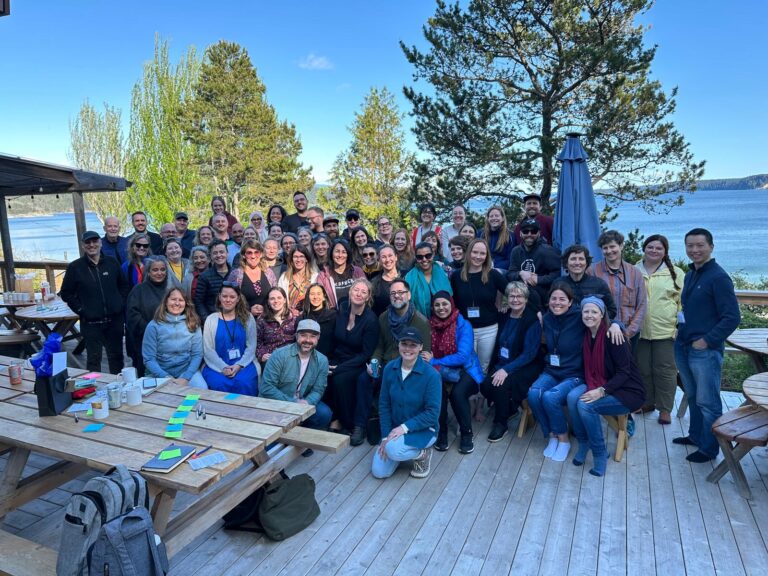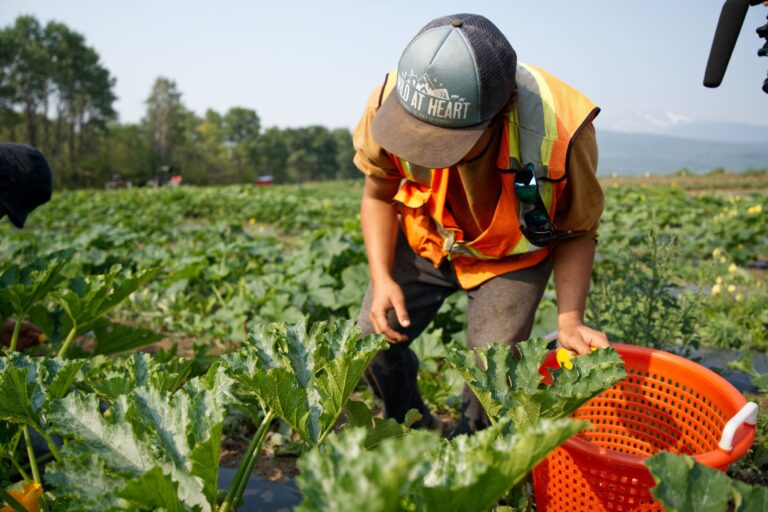13 July 2017
Introducing Kanuu’s Executive Director Danielle Levine
New Executive Director for Program Aiming to Address Indigenous Unemployment Hits the Ground Running
Interview by Cindy Hughes
Danielle Levine has never been afraid to try new things or explore what she calls “paths that never seemed like paths.” So her new role as the CEO for Kanuu, an organization being incubated at Urban Matters CCC that’s all about social enterprises in Indigenous communities, is fitting.
Danielle has been following her dreams since growing up in Winnipeg where she was part of the first generation to leave. From travelling to a new country each year, participating in obstacle course races and Habitat for Humanity builds, you’ll rarely find her sitting around. She recently left her position at UBC to take the helm of Kannu. We spoke with Danielle about Kannu, her career and her hopes for the future.
Danielle, you left a prestigious position running the Indigenous Business Program at the Sauder School of business to come work with Kannu and Urban Matters. What attracted you to this position?
DL: In my heart I am very entrepreneurial. When I read the job description, it was like a blank canvas. It was an invitation that said, ‘let’s create something that will really have impact in the community,’ and that spoke to me.
I’m here to address gaps I was seeing that didn’t live inside the classroom. In my work at UBC, students were telling me about their communities—about how a 50 percent unemployment rate was normal. To me that is not normal; that’s a crisis. There was a growing sense of urgency for me. When people aren’t working it creates a whole host of social issues. I wanted to roll my sleeves up and work to address that and Kanuu is tailored to do just that.
And can you talk a bit about Kanuu and its goals?
DL: Kanuu is an indigenous led national non-profit that focuses on grassroots indigenous entrepreneurship development. Employment levels for Indigenous Peoples in Canada are unacceptable. This program is about changing that. We want to help people create their own meaningful employment—this is not a program about just creating more that jobs, it’s about creating livelihoods.
“This program is about channeling the entrepreneurial spark that already exists in Indigenous communities.“
I’m passionate about entrepreneurship and social entrepreneurship and so we don’t just want to teach people to write a business plan, but how to think with an entrepreneurial mindset. That’s far more empowering than teaching ABC s of a business plan. We’re here to nurture the development of leaders.
What else is different about this program?
DL: Kanuu challenges the prevailing wisdom about how to best support local Indigenous Entrepreneurs. We’re focusing on doing things differently.
One of the key differences here is our ‘in-reach’ approach. We’re not connecting asking people to travel large distances to see us—we are going right into communities to meet people face-to-face and eye-to-eye. We are going out to physically meet people where they are. We are respecting Indigenous ways of learning and stripping away Westernized business jargon.
This program is about coaching and mentorship and ultimately about channeling the entrepreneurial spark that already exists in Indigenous communities. It’s a move away from the academic teaching of entrepreneurship to the actual nuts and bolts that will help people be successful.
Watch Danielle’s presentation at the the recent SFU Hopeful Economics Summit
Can you describe some of your clients?
DL: We have already delivered an exciting pilot in Saskatchewan. We focus on “wantrepreneurs”- people who want and desire entrepreneurship.
Our programming goes all the way back to the basics. We look for indigenous people who want things to be different and want to work for it. Finding that spark is the beginning. Even if people don’t have fully formed business ideas, we deliver programming in community tailored to the local context to kickstart the entrepreneurship process. Through intentionally short workshops, we help people see opportunity right in their community. Once those with desire and drive are identified, we are there to support them.
Kanuu Goals:
- To prioritize the long-standing concept of social enterprise by sharing stories and experiences
- To unearth budding social entrepreneurs, businesses and organizations
- To nurture individuals and organizations on the journey towards social enterprise
- To support them through the early years of business launch with mentorship, and coaching
When you look to the future, what are some of your hopes and aspirations for this program?
DL: Down the road I see so much potential for international collaborations with indigenous communities worldwide. There’s opportunity to think outside the box and focus on creativity, hopefulness and resilience. It doesn’t happen overnight, but if we can capture the imagination of people in communities that have had really long term unemployment and bring some fire to the enthusiasm that is under the surface there—that’s really what we’re trying to do. Taking a wantrepreneur to an entrepreneur is an exciting proposition for me. Watching ideas come to life or fail and reincarnate is absolutely amazing. That is the essence of hopeful economics.
Thank you for speaking with us Danielle. It sounds like this job is all consuming! For those who don’t know you, can you talk a bit about what you do when you aren’t working?
DL: Well I am rarely bored! This fall I am headed to Santiago Chile. And I have a ten-year-old daughter who keeps me busy. She’s as passionate about contributing to the community as I am. Recently it was her tenth birthday and I told her we could do whatever she wanted—what she wanted was to attend a fundraiser for mustang horses. Seeing her drive to contribute makes me so proud. And when I’m not with her, I am doing volunteer work, I’m on the board at the Vancouver Native Housing Society, or I’m at spin class or hiking. But to be honest yes, the job is all consuming these days (laughs).
Good luck in this position Danielle—we think you’re the woman for the job.




